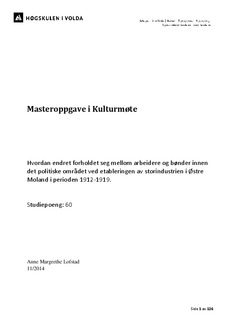| dc.contributor.author | Lofstad, Anne Margrethe | |
| dc.coverage.spatial | Østre Moland | nb_NO |
| dc.coverage.temporal | 1912-1919 | |
| dc.date.accessioned | 2014-12-17T08:58:27Z | |
| dc.date.available | 2014-12-17T08:58:27Z | |
| dc.date.issued | 2014 | |
| dc.identifier.uri | http://hdl.handle.net/11250/227588 | |
| dc.description.abstract | Summary
This master thesis in culture encounter is about how the relationship between workers and peasants was changed within the political domain during the large-scale industry establishment in the period 1912-1919. The culture encounter took place in the municipality of Eastern Moland. The municipality consisted of the peasant village of Moland and the coastal village of Stokken. The creation of two major companies in Stokken led to a large migration of workers mainly from the neighbouring areas. Mainly the Bourdieu’s habitus and capital theories have been used when analyzing the political domain. I have examined who the workers and peasants were before the culture encounter. The workers had the background as workers, craftsmen, sailors and from agriculture. Most of them came from the lower classes, but weak political polarization and strong countercultures in the area where they grew up contributed to a low radical habitus. The Labour party doubled its support level during the period, and the non-socialist parties formed joint lists in order to counteract the socialist influence. Peasants with relatively large farms and fortune dominated the local politics in the first periods. The peasants of Moland had the political power, because they had the majority of the delegates. Accusations of power abuse were brought from the Stokken representatives. A claim for municipality partition was promoted already in 1914, and the partition became a reality in 1919. Not until the period 1917-1919 Stokken got just as many representatives as Moland, and the socialists got just as many representatives as the non-socialists. The conflict between the workers and the peasants followed the socio-economic conflict lines. Different lifestyles and needs in Moland and Stokken created conflicts when the municipal council was negotiating the budget and the grants. The low taxation of the peasants provoked the working class. The world war, supply problems and high cost of living escalated the conflicts. Radicalization of the labour movement also contributed to the internal problems and to increased fear among the peasants. The labour movement in the Eastern Moland was only partly radicalized, and this was manifested in the trade unions. The socio-cultural conflict lines, as temperance, religion and the relationship to the national community, did not always follow the socio-economic distinctions. | nb_NO |
| dc.language.iso | nob | nb_NO |
| dc.publisher | Høgskulen i Volda | nb_NO |
| dc.subject | bønder | nb_NO |
| dc.subject | industriarbeidarar | nb_NO |
| dc.subject | industrialisering | nb_NO |
| dc.subject | industrireising | nb_NO |
| dc.subject | smelteverk | nb_NO |
| dc.subject | kulturmøte | nb_NO |
| dc.subject | innflyttarar | nb_NO |
| dc.subject | politikk | nb_NO |
| dc.subject | kommuneval | nb_NO |
| dc.subject | lokalpolitikk | nb_NO |
| dc.subject | sosialistiske parti | nb_NO |
| dc.subject | landsbygda | nb_NO |
| dc.subject | jordbruksbygder | nb_NO |
| dc.subject | austre moland | nb_NO |
| dc.subject | eydehamn | nb_NO |
| dc.subject | Eydehavn | nb_NO |
| dc.subject | Østre Moland | nb_NO |
| dc.subject | sosiale skiljeliner | nn_NO |
| dc.subject | sosiale motsetnader | nn_NO |
| dc.subject | lokalhistorie | nb_NO |
| dc.subject.ddc | 948.3121051 | |
| dc.subject.ddc | 320.9483121951 | |
| dc.subject.ddc | 303.48209483121051 | |
| dc.subject.ddc | 305.5090483121051 | |
| dc.title | Hvordan endret forholdet seg mellom arbeidere og bønder innen det politiske området ved etableringen av storindustrien i Østre Moland perioden 1912-1919 | nb_NO |
| dc.type | Master thesis | nb_NO |
| dc.subject.nsi | VDP::Humanities: 000::History: 070::Modern history (after 1800): 083 | nb_NO |
| dc.subject.nsi | VDP::Humanities: 000::History: 070::Political history: 071 | nb_NO |
| dc.subject.nsi | VDP::Humanities: 000::History: 070::Social history: 072 | nb_NO |
| dc.subject.nsi | VDP::Humanities: 000::Cultural science: 060::Nordic cultural science: 061 | nb_NO |
| dc.subject.nsi | VDP::Humanities: 000::History: 070::Economic history: 074 | nb_NO |
| dc.subject.nsi | VDP::Social science: 200::Political science and organizational theory: 240::Comparative politics: 241 | nb_NO |
| dc.subject.nsi | VDP::Social science: 200::Social anthropology: 250 | nb_NO |
| dc.source.pagenumber | 126 | nb_NO |
| dc.subject.keyword | Arendal smelteverk | nb_NO |
| dc.subject.keyword | Det Norske nitridaktieselskap | nb_NO |
